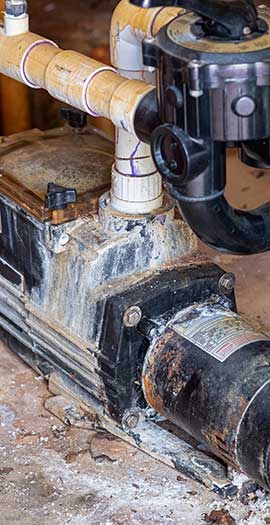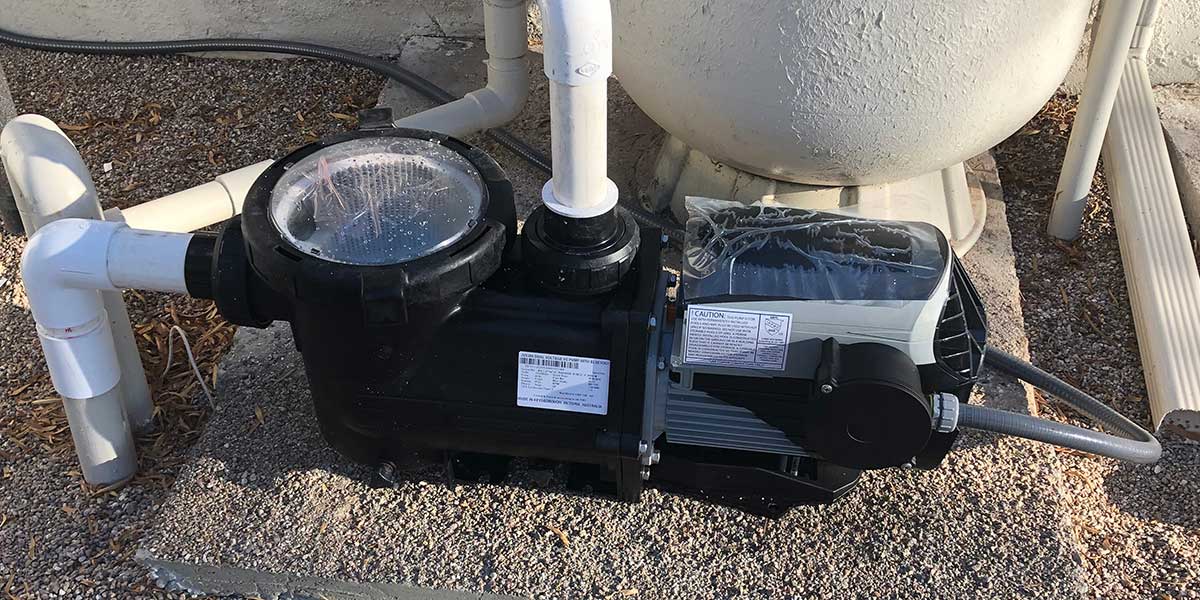Pool Pump Repair and Pump Installation

Quick Navigation
- Common Issues with Pool Pumps
- Is Your Pool Pump Malfunctioning or Inoperative?
- Different Types of Pool Pumps and How They Work
- Indicators That Pool Pump Repair and Service is Necessary
- Determining the Need for a Pool Pump Replacement
Having an operational pool pump is probably the most important element of maintaining your pool. It operates by circulating water from the pool via the filter, heater, and chlorinator. As a result, when the water returns to the pool, it’s already clear of debris, warmed to the ideal temperature, and thoroughly disinfected.
If any issues arise with your pool pump, contact Living Water Pool Company for pool pump motor repair services.
Revive Your Pool to Perfection: Contact Living Water Pool Co for Top-notch Repair and Service in Arizona!
Request a Free Quote Today!
Click the button below to be connected to our pool professionals that are here to answer all of your questions.
Common Issues with Pool Pumps
Pool pump problems can vary from a failed motor to deteriorated seals. Regardless of the issue, the pool pump specialists at Living Water Pool Company can assist in repairing or replacing your pump.
- Water Leakage – It can sometimes be challenging to determine if your pool pump leaks or malfunctions. Water leakage can manifest as an obvious pool or a barely noticeable drop. Any form of leakage will disrupt the internal pressure of your pump and gradually decrease your pool’s water levels.
- Air Leakage – Pumps can lose their suction even without water leakage, as they can sometimes leak air. The pressure equilibrium within your pump is finely tuned, and any air escaping can negatively impact this, diminishing the pump’s performance.
- Prime Loss – Losing prime means that your pool isn’t getting sufficient water flow. This issue can arise when the water levels drop too low to fill your skimmer adequately. Optimal water levels should reach halfway up your skimmer’s opening. While this problem can typically be resolved by adding more water, professional assistance may be required to tackle the root cause of the water loss.
- Impeller Blockage – The impeller, a component that rotates and propels water through the pump, can become jammed or blocked, causing the entire pump to halt. Impeller blockages are typically the result of small sticks, mulch, or other debris bypassing the pump basket.
- Motor Failures – The motor, responsible for spinning the impeller, can overheat or seize up in various ways. When it’s faulty, your pump is unable to perform its function. Motors commonly seize or overheat due to aging, blockages, or running without water. You’ll require expert pool pump motor repair and replacement services if your motor is damaged.
- Damaged Pump Baskets – Acting as the final barrier, your pump basket is designed to trap any sticks, leaves, or other debris bypassing your skimmer basket. If your pump basket is broken, damaged, or missing, these pieces of debris can penetrate the moving parts of your pump, causing a blockage.
Is Your Pool Pump Malfunctioning or Inoperative?
A malfunctioning or broken pool pump halts the cleaning process, which can eventually cause your pool water to take on a greenish hue, regardless of the amount of chlorine you use.
To maintain clean and clear pool water, your pump must operate fully. Numerous factors could cause pool pumps to break or cease functioning.

Determining the Need for a Pool Pump Replacement
Choosing between repairing or replacing your pool pump can be a challenging decision. We frequently hear pool owners ask, “How can I tell if it’s time to replace my pump?” It’s not always straightforward.
While our skilled pool technicians can guide you in determining whether your pump requires repairs or a full replacement, several factors should be taken into account:
- The lifespan of the pump
- Comparison of the pump’s price to the repair costs
- Benefits of upgrading to a newer model
- Probability of needing additional repairs in the future
- Availability of energy-saving pump alternatives for your replacement
Considering all these factors will aid you in making an informed decision about whether repairing or installing a new pool pump is the optimal choice for your situation.
Indicators That Pool Pump Repair and Servicing is Necessary
Knowing when your pool pump needs a repair or service is key to maintaining its functionality
Here are some signs to look out for, indicating that your pool pump may require attention or repair:
- Broken seal: A clear sign of this rubber O-ring’s failure, which securely fastens your pump to the pump casing, is water seeping out of the pump casing. This will hamper your pool pump’s functionality.
- Worn impeller: The impeller plays a pivotal role in your pool pump by propelling the water through the pumping system. A low reading on your filter pressure gauge could indicate a worn-out impeller.
- Damaged motor shaft: The power source for your pump is the motor. If you spot water leakage beneath your pump, this could indicate a damaged motor shaft and impact the effectiveness of your pool pump.
- Noisy pump: A loud pool pump could point to a blocked filter or impeller, which you can unclog. However, a high-pitched screaming sound from your pool pump could signify the need for new bearings.
- Non-functional pump: A disconnected wire or a blown fuse could be one of the reasons your pool pump isn’t working. Given the involvement of various electrical elements, it’s best to entrust the troubleshooting to a pool pump repair service.

